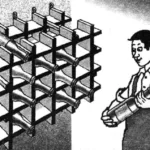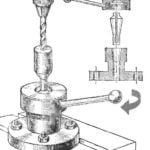 SEAPLANE MBR-2. Scale model 1:33.
SEAPLANE MBR-2. Scale model 1:33.
The proposed paper model is a copy of the specific MBR-2, anoit the collective nature of the image of the sea “ambarchik” plane, designed for intelligence, but due to circumstances became a night bomber in the early and most difficult years of the great Patriotic war.
By the time of the German attack on the Soviet Union – the largest seaplane in the red army.At that time in the naval connections were present only MBR-2 with engines M-34НБ. Aircraft of this type were also in the air force (as a transport and is intended for aerial photography in the far East) and in parts of the NKVD. Interestingly,MBR-2 first entered aerial combat in the initial phase of the great war: two aircraft of the Baltic fleet was attacked by German fighters an hour before the attack of the fascists around the perimeter of the borders of the USSR. In June 1941 near Riga these flying amphibian was used as a melee scout, night and even daytime bombers and anti-submarine aircraft. MBR-2 provided escorts to convoys of transports and warships. Participated in the defense of the Hanko Peninsula, was active on the approaches to the city of Lenin. Was used for the evacuation of downed aircrews and as the spotters (in August 1942 near Leningrad).
On the black sea, these legendary aircraft the next day after the beginning of the war, bombed the Romanian port of Constanta. In late 1941, irreparable losses in aircraft were forced to withdraw from schools and CAF and apply to fleets of obsolete MBR-2 with engines M-17B.Later, these amphibians participated in the defense of Odessa, Sevastopol, Kerch and Novorossiysk.Seaplanes MBR-2 was used for reconnaissance over the sea and night bombing. Strikes at airfields, ports and railway nodes. A successful RAID in the spring of 1942 made on the airfield near the Crimean town of Saki. Flying boats made raids on the Crimea in the summer of 1943, supported the landing of troops near Kerch. Somewhat later, the MBR-2 was used in the liberation of Novorossiysk,the battles on the Taman Peninsula. In landing of Marines in Novorossiysk used RC boats, novodevitsa aircraft MBR-2ВУ.
In the Northern fleet flying boats carried out reconnaissance and conducted a search of enemy submarines. These aircraft were also used to escort allied convoys on the last leg of their journey to Murmansk and Arkhangelsk. 10 July 1942 MBR-2 is attacked and damaged by German submarine, then finished off the patrol ship. In the Baltic, the MBR-2 was used until January 1944, the Black sea and in the North in small quantities until the end of the war.Wanted floating mines was carried out and after the cessation of active hostilities. In the Pacific theater of operations, these aircraft remained in service the entire period of hostilities against Japan, although gradually replaced by other flying boats. They conducted reconnaissance near the coast. Made several night raids on ports of samurai, including Yuki in Korea. In operations against the Japanese were using and flying boats of the Amur flotilla, as well as aviation marine-injuries. After the surrender of Japan, MBR-2, air force, the Northern Pacific flotilla was used for landing on the Kuril Islands.

The transport of MP-1, MP-1bis, MP-1T (disarmed ICBM-2) were operated in separate units and air groups (later the traffic shelves) the CAF attached to the fronts and fleets, particularly in the Karelian-Finnish group. As the transport was also used and fighting, MBR-2 (evacuation from the Moonzund, Sevastopol, delivery of goods to the garrison of Hanko). In operations in the North was also attended by MP-1 and MP-1 bis Polar aviation house. They have been used for patrolling the White, Barents and Kara seas. Many of the captured MBR-2 (5 units) was repaired by Finns and were used in the Baltic until October 1942. They conducted reconnaissance in the Finnish and Bothnia gulfs, leaflets and occasionally worked as a transport aircraft.
Flying boat, monoplane of mixed construction with a single motor.The power plant is located on the farm above the wing.Wheel-ski landing gear was removable (on the wheels were applied only to machines the modification of the MBR-2bis). MBR-2 was designed in the brigade No. 5 CDB under the direction of G. M. Beriev with the introduction of elements of the project MBR-1 R. L. Bartini. It was originally called “25” (p-5). The prototype seaplane made its debut on may 3, 1932. State tests were conducted in January-February and August 1934. Since the beginning of the summer of the same year serial production of the MBR-2 was started at plant No. 31 in Taganrog and later at plant No. 45 in Sevastopol. Just produced 1,365 copies (along with the passenger of MP-1 and MP-1 bis, about one-third of the total — with engines M-17). The crew of 3 people. The engine M-17,later — M-34B/NB. Armament 2-4×7,62, bombs up to 500 kg, in the Baltic during the war he established Nursi.MBR-2 officially entered service in the USSR in August 1934.
On the basis of both modifications were made seaplane MBR-2ВУ for targeting radio-controlled torpedo boats. They made more than 50 copies.
MBR-2 with engines M-17 entered the air force of the Pacific fleet in early 1934, at the black sea and Baltic fleets — in the middle of the same year, the Northern fleet in September 1936.Since 1937, the MBR-2 became the most popular seaplane in the Soviet air force. In the summer of 1938, during the fighting at lake Khasan, a flying boat of the Pacific fleet accompanied by transports carrying cargo in the Bay of POS’et. In the winter of 1939-1940, they were used in the war with Finland as scouts and light night bombers, flying on skis. Participated in joining the Soviet Union the Baltic countries. Production of the MBR-2 was completed in early 1940. With weapons they took off in 1946. In the CAF and polar aviation-MP-1 bis was operated until the beginning of 1950-ies.
Tactical and technical characteristics.
MBR-2 bis (motor M 34НБ).
Wingspan: 19,0 m.
Length: 13,5 m.
Motors, the quantity x capacity: 1 x 830 HP
Takeoff weight, maximum: 4580 kg.
Maximum speed: 275 km/h.
Service ceiling: 6600 m.
Travel distance: 2065 km.
The materials to build a model SEAPLANE MBR-2 (download)



